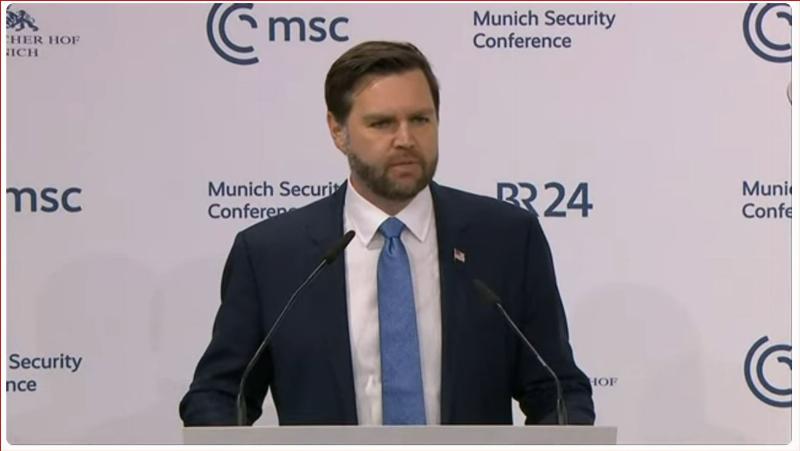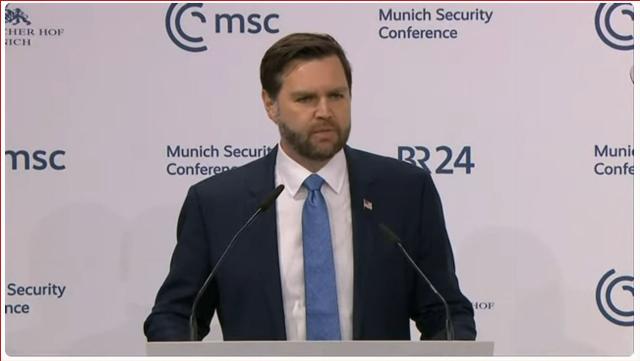


Addressing the Munich Security Conference, Vice President J.D. Vance took aim with both barrels at various EUropean platitudes. Considering the number of sacred cows he gored, you might have called it the Munich Abbatoir. (Note: EUropean is not a typo — it is intended to highlight the special role the European Union arrogates to itself to speak for all “true” Europeans.)
Munich is no ordinary confab: It’s EUrope’s premier gathering of political, military, and security policymakers, including most heads-of-state and government. The only place Vance could have made his points more markedly would have been in Brussels itself — but then we’d have to have loaned Flemish artist Rubens’s “Daniel in the Lion’s Den” from the National Gallery for a backdrop.
Vance said many important things — about security, free speech, democracy, mass migration, and fair burden-sharing for defense costs. But I want to pull one thread that may not get sufficient attention: the confusion about our own Western cultural identity.
[T]he threat that I worry most about for Europe is not Russia. It’s not China. It’s not any other external actor. What I worry about is the threat from within—the retreat of Europe from some of its most fundamental values, values that are shared with the United States of America [emphasis added].
Precisely.
The West’s fundamental problem is not with China, Russia, or Islam. Yes, they are all threats — very dangerous threats. But we’d be mistaken — badly mistaken — if we imagined the divide is “the West versus the rest.” No, the biggest threat, the most dangerous divide, is inside the West itself.
Contemporary Polish political philosopher Zbigniew Stawrowski argues that the West’s identity crisis stems from not knowing its roots. More precisely, it stems from confusing its roots with the cuckoo eggs laid in its nest by Enlightenment and post-Enlightenment thought. The latter have co-opted the West’s language — about “rights,” “freedom,” “man,” and “democracy” — redefining them into polar opposites of what they have meant to the West itself. So “the right to speak” becomes “the right not to be offended,” “following the science” means playing gender-pretend, and “democracy” means cancelling the views of that part of the demos that EUro elites don’t like. Elite “sleek barbarians,” attired not in fur skins but Gucci power suits and white medical coats, impose that barbarism and crush dissent precisely in the name of “rights” and “freedom.”
From where did this cuckoo’s egg of ersatz Western values come? From a mindset, starting in the “Enlightenment” and ripening ever since, that what George Weigel called the three-legged stool of Western culture — Athens, Rome, and Jerusalem — will be just as stable if bottom surgery amputates one of those legs (the Jerusalem one). In other words, from Kant and French Revolutionary laïcité onwards, Western culture should define itself as if Judaism and Christianity had no role in its formation, as if God did not exist. Having thus been shuffled out of Brussels, Europe could then define “reality” (including “rights, “democracy,” etc.) as it liked. The old terms would be useful linguistic Potemkin Villages, but the content would be all new.
J.D. Vance brought the culture war to EUrope.
More accurately, Vance expressed what has been percolating on the European street and in many recent national and EU elections, rumblings the EUropean establishment refused to acknowledge. It says something about the maturity of EUropean politics that it took an American vice president to give average Europeans a voice against EUrope.
Both sides of the Atlantic need each other. Vance’s Munich speech addressed particulars about where that relationship needs recalibration. But it was not primarily about wonk or technical issues: you should be spending X, building Y, or planning for the third plenary meeting of sherpas on Balkan military mobility in Z.
Vance opened the aperture more widely, especially on the sensitive turf EUropeans like to think is their special preserve: democracy, rights, and freedom. Our relationship will never be more than usefully transactional if it focuses on the wonk stuff. But it will not move beyond that unless EUrope and the United States both recover shared understandings of the authentic foundations of our culture and are beware of all imitations, imitations often not so cheap in their human toll.
In that sense, Vance’s Munich address was an outlier, far outside the range of the usual nostrums proclaimed in the Bavarian capital. But, if politics and even security are downstream from culture, it touched on the real rocks on which both of the former are built.
That said, I’d have loved to have been a fly on the wall in EUrope’s Kaffeehäuser that evening.

Image: Fox News video screenshot, with permission.
